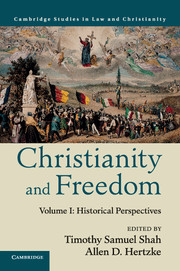Book contents
- Frontmatter
- The Religious Freedom Research Project
- Contents
- Contributing Authors
- Acknowledgments
- Introduction: Christianity and Freedom: Ancient Roots and Historical Innovations
- 1 The Roots of Religious Freedom in Early Christian Thought
- 2 The Christian Roots of Religious Freedom
- 3 Lactantius on Religious Liberty and His Influence on Constantine
- 4 Augustine and Religious Freedom
- 5 Christianity and the Roots of Human Dignity in Late Antiquity
- 6 Liberty of Conscience and Freedom of Religion in the Medieval Canonists and Theologians
- 7 Faith, Liberty, and the Defense of the Poor: Bishop Las Casas in the History of Human Rights
- 8 Calvinist Contributions to Freedom in Early Modern Europe
- 9 Constitutional Protection of the Freedom of Conscience in Colonial America: The Rhode Island and Pennsylvania Experiments
- 10 Christianity and Freedom in the American Founding
- 11 Vibrant Christian Pluralism and the Evolution and Defense of Religious Liberty in America
- 12 Orthodox Christian Contributions to Freedom: Historical Foundations, Contemporary Problematics
- 13 Christianity: A Straggler on the Road to Liberty?
- 14 Protestant Missionaries and the Centrality of Conversion Attempts for the Spread of Education, Printing, Colonial Reform, and Political Democracy
- 15 God and Freedom: Biblical Roots of the Western Idea of Liberty
- Index
7 - Faith, Liberty, and the Defense of the Poor: Bishop Las Casas in the History of Human Rights
Published online by Cambridge University Press: 05 May 2016
- Frontmatter
- The Religious Freedom Research Project
- Contents
- Contributing Authors
- Acknowledgments
- Introduction: Christianity and Freedom: Ancient Roots and Historical Innovations
- 1 The Roots of Religious Freedom in Early Christian Thought
- 2 The Christian Roots of Religious Freedom
- 3 Lactantius on Religious Liberty and His Influence on Constantine
- 4 Augustine and Religious Freedom
- 5 Christianity and the Roots of Human Dignity in Late Antiquity
- 6 Liberty of Conscience and Freedom of Religion in the Medieval Canonists and Theologians
- 7 Faith, Liberty, and the Defense of the Poor: Bishop Las Casas in the History of Human Rights
- 8 Calvinist Contributions to Freedom in Early Modern Europe
- 9 Constitutional Protection of the Freedom of Conscience in Colonial America: The Rhode Island and Pennsylvania Experiments
- 10 Christianity and Freedom in the American Founding
- 11 Vibrant Christian Pluralism and the Evolution and Defense of Religious Liberty in America
- 12 Orthodox Christian Contributions to Freedom: Historical Foundations, Contemporary Problematics
- 13 Christianity: A Straggler on the Road to Liberty?
- 14 Protestant Missionaries and the Centrality of Conversion Attempts for the Spread of Education, Printing, Colonial Reform, and Political Democracy
- 15 God and Freedom: Biblical Roots of the Western Idea of Liberty
- Index
Summary
Many citizens of our global society have placed a utopian hope in human rights since the collapse of other twentieth-century political utopias. Nevertheless, the political doctrine of human rights has its strong critics. Postcolonial, Islamic, East Asian, and Marxist thinkers have indicted human rights, in various ways, as the latest brand of Western imperialism masquerading under the banner of universal equality. In response to this Occidentalism, certain scholars have strengthened their claims about the distinctively Western origins of human rights. These intellectual histories are unabashedly apologetic and committed to preserving the singular legacy of universal rights that the West has bequeathed to the rest of the world. Theirs is a secular liberal narrative, which presents the Western idea of human rights as a logical progression away from its religious roots toward a political humanism culminating in modern democratic revolutions, the abolition of the slave trade, and the 1948 United Nations Universal Declaration of Human Rights.
However, any secularist narrative of human rights that writes off or downplays the importance of historical religious traditions risks losing necessary critical resources for promoting this very attractive, yet deeply contested, doctrine. The law and religion scholar John Witte Jr. has drawn attention to at least three major oversights that result from ignoring the unique contribution of religion to the discourse and practice of rights, which is like cutting off rights from its source. “Without religion,” Witte claims, “human rights become infinitely expandable … become too captive to Western libertarian ideals,” and, finally, “the state is given an exaggerated role to play as the guarantor of human rights.” The corresponding dangers associated with a purely secular human rights project admit of hyperindividualism, neocolonialism, and totalitarianism, however disguised. Witte has described a growing human rights hermeneutic emerging out of various religious traditions resistant to these corrosive effects on individuals and societies.
It is widely acknowledged that the horrendous loss of innocent life during the twentieth century set the awful stage for the development of the UN declaration. Less known, however, was the vision of Christian love promoting equal rights for believers and unbelievers born out of the crucible of brutal enslavement and the oppression of indigenous peoples in the New World during the Spanish conquests of the sixteenth century.
- Type
- Chapter
- Information
- Christianity and Freedom , pp. 176 - 209Publisher: Cambridge University PressPrint publication year: 2016
- 2
- Cited by



